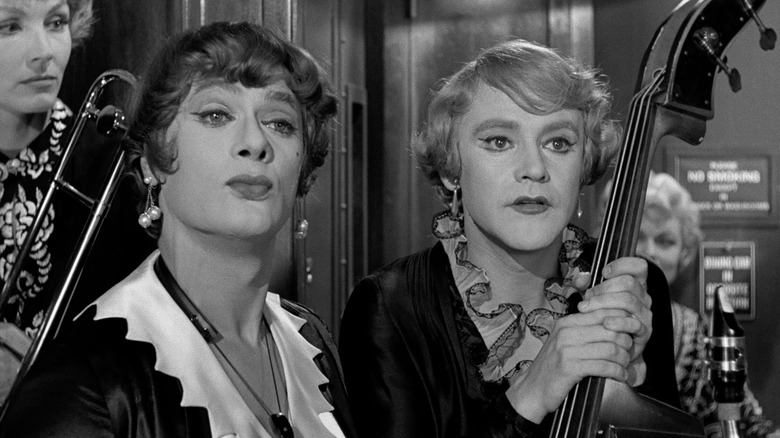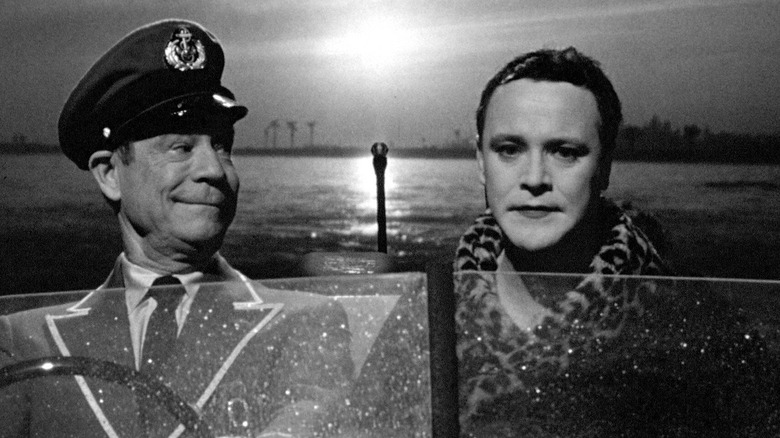Some Like It Hot Ending Explained: Nobody's Perfect Except The Ending Of This Movie
Truly outrageous that I'm out here writing an ending explainer for a film that's older than my parents, but when it comes to a film as wonderful and boundary breaking as "Some Like It Hot," there's no such thing as over-analyzing. Directed by Billy Wilder and released in 1959, the film stars Marilyn Monroe, Tony Curtis, and Jack Lemmon in a story about two musicians who witness mafia gangsters committing a crime, and go into hiding by dressing like women. Critics and audiences loved the film upon release, and the United States National Film Registry chose the film as one of the first 25 worthy of preservation.
What makes the film so groundbreaking is that it was produced without approval from the Motion Picture Production Code (Hays Code), due to the LGBTQ+ related themes like cross-dressing. At this point in time, the production code was already starting to lose power due to progressing social tolerance, but wasn't officially disbanded until 1968. The massive success of "Some Like It Hot" is considered by many film historians as one of the inciting incidents that led to the death of the Hays Code. But it wasn't just the cross dressing that shocked the production code enforcers, it was also the film's subversive ending.
The Inversion of Gender Identity
"Some Like It Hot" feels like a modern retelling of a Shakespearan comedy, a film filled with elaborate costumes, constant crossing of social classes and gender identity, cross-dressing, mistaken identities, and a script absolutely dripping with double entendre. The film fits right alongside plays like "Twelfth Night," which is why the at-the-time head of the Motion Picture Association of America, Geoffrey Shurlock, came to the film's defense upon release. It's important to note that Hollywood has had a serious problem with the way that transgender, cross-dressing, and other gender non-conforming people have been portrayed, and there are plenty that (rightfully) feel "Some Like It Hot" falls under that umbrella. Those criticisms are valid and worthy of merit, but unlike something like "Ace Ventura: Pet Detective," the ending of "Some Like It Hot" is wonderfully affirming in its subversion.
Throughout the film, Jerry's drag persona Daphne (Jack Lemmon) has caught the eye of a millionaire named Osgood Fielding III (Joe E. Brown). After Jerry, Joe (Tony Curtis), and Sugar (Marilyn Monroe) are forced to flee on Osgood's boat to escape the mob, the truth comes out. Osgood has fallen in love with Daphne and explains to her that his mother wants her to wear her wedding dress when the two get married. Daphne, knowing the jig is up, begins listing all of the reasons why she can't marry Osgood, but he's not hearing it. In one last ditch effort, Jerry removes his wig and confesses, "You don't understand Osgood; I'm a man!" Rather than panic or show any sort of anger, Osgood simply smiles and says, "Well, nobody's perfect." The screen fades to black, Osgood still smiling and Jerry in disbelief that Osgood isn't upset.
Daphne is Jerry, Jerry is Daphne
Looking at both Jerry and Joe, Jerry is the one of the two who most fully embraces his feminine identity. He chooses the name Daphne because he's "always liked it," and his interest in Sugar is less about sexual attraction and more about genuine admiration. When Osgood proposes to Daphne, she accepts his offer and seems joyous about it. She tells Joe about the engagement and he asks "Who's the lucky girl?" and Daphne gleefully announces, "I am!" I'm not going to be that person who tries to slap a gender identity label on a fictional character without their consent, but there's definitely a trans read that can be made for Daphne, which makes the ending of the film all the more important.
Even today, films utilize gender reveals as shocking moments or punchlines, but Daphne's reveal of Jerry is a total non-issue set a decade before the Stonewall riots. Osgood genuinely doesn't care if Daphne was assigned male at birth, and his laissez faire attitude has been interpreted by many as showing that he knew all along but fell in love with Daphne anyway. This progressive ending sparked a massive outrage from conservatives, but the film was a rousing success regardless. It's impossible to know if Billy Wilder knew just how important this moment would be in the context of queer film history, or if he was just trying to end the film on a solid moment of comedy, but the ending of "Some Like It Hot" remains one of the greatest in cinema history.


